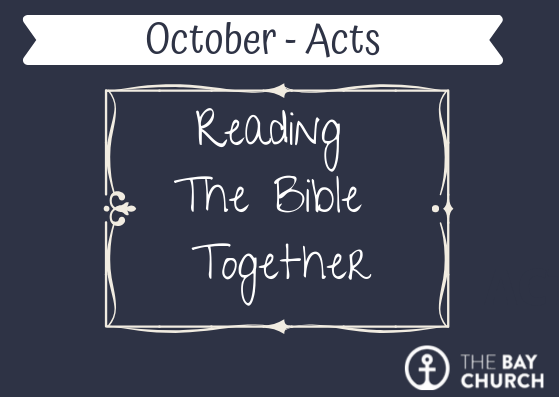This month we will we will be reading Acts together. This overview of the book is to help you as you read:
Acts
Acts is the second book in the New Testament from the pen of Luke the doctor. His first book, the Gospel of Luke told all that ‘Jesus began to do’ (Acts 1:1). Acts continues the story telling us what happened next. Luke wants us to know what Jesus continued to do once risen, ascended and seated on the throne in heaven. Luke tells the story of the growth of the early church, and the unstoppable spread of the gospel!
Acts is an exciting, fast moving account told with an historian’s eye for accurate detail, and a theologian’s eye for the hand of God and the glory of Christ. Acts begins with Jesus leaving the disciples with instructions to wait in Jerusalem for the Holy Spirit to come. In chapter two the Spirit comes at Pentecost and this small group of fearful followers are turned into a bold body of believers declaring the risen Christ as the Saviour of the world.
Luke records the initial explosion of the gospel in Jerusalem, the resulting persecution and spread of new believers throughout the region. The focus of attention soon moves from Peter, to the converted persecutor Saul (Paul) who on meeting the risen Saviour becomes a missionary. Paul (who in the first half of the book is a violent enemy of the church), in the second half becomes a passionate servant. The dramatic change in him is an example of God’s grace and power to save.
Outline
The book can be broken down into these main sections.
- The Lord’s Word in Jerusalem (1:1-8:3)
- The Lord’s Word Dispersed to Judea & Samaria (8:4-12:24)
- The Lord’s Word to The Ends of The Earth Part 1: Asia and Greece (13-20)
- The Lord’s Word to The Ends of The Earth Part 2: Rome (Ch. 21-28)[1]
Things to look out for in Acts
- The Church & Persecution: As exciting as Acts is, it’s not all plain sailing for the church. It doesn’t take long for opposition to form, and persecution to break out. Just like in the life of Jesus, his followers experience the hatred of the world. Believers are imprisoned, hounded, beaten and killed, yet wonderfully none of this activity halts the progress of the gospel.
- The Ends of The Earth: Luke in the sermons he records makes clear that the gospel preached is a continuation of the God of Israel’s salvation plan. Now the Messiah had come and achieved salvation and so the message is for the whole world, Jews and Gentile alike. Jesus at the start of the book makes clear the gospel is to move from its Jewish beginning to the ends of the earth. Luke traces this movement until we find Paul in Rome at the end to the book, having reached Rome, the ends of the earth are in sight.
- The Jews & The Gentiles: A significant challenge to the early church was what it meant for Gentiles (non-Jewish) people to respond to the gospel message. In ch.10 we see Peter requiring a vivid vision to ensure that he was ready to break out of the Jewish bubble and make the gospel known to gentiles. In chapter 11 Peter reports “God gave the same gift to them as he gave to us when we believed.” v.17. The Emphasis on Gentile conversion builds with Paul’s ministry.
The Gospel in Acts
- Resurrected Jesus: The apostles preach Good News to the world because of the resurrection of Jesus. In him, God is at work reconciling sinners to himself. There is salvation in him and him alone for any who repent and believe in him.
- Gospel Preaching: Much of the book of Acts is made up of sermons, recorded by Luke. We are here given an insight into the boldness and teaching of the earliest gospel preachers. It is not just the apostles who preach but normal believers as they scatter under threat of persecution they go ‘preaching the word’ (8:4) in the new areas they find themselves.
- One Message, Various Contexts: Throughout the book Luke records the same message being shared in a variety of contexts. Jews hear the gospel (2-5) as do Gentiles (8, 10), a business woman and a jailer respond to the gospel (16). In Ch.17 we have Paul preaching in the Synagogue (religious Jews) and in the Areopagus (philosophizing Greeks). Toward the end of the book Paul proclaims the gospel to governors (24) and Kings (26).
Bay Church Reflections
Throughout October we will look to refer to Acts as often as possible. We hope this will increase our familiarity with the book and provide more opportunity to learn from it.
- Introductory Sermon – Sunday 29th – No Audio Available.
- Home Groups – South Group Wed 9th & 23rd North Group Mon 7th & 21st
- Children’s Address during Morning Meeting. – Sunday 6th, 13th, 20th 27th
Resources
The following book is a helpful guide, available to borrow from The Bay Church Library in the Church Office
- John Stott, The Message of Acts (BST)
The following video from The Bible Project may also provide a helpful overview.
- https://thebibleproject.com/explore/acts/
Questions
If you have any questions about the book of Acts as you read please contact Andrew: andrew@thebaychurch.org.uk
[1] Outline from, Reformation Study Bible (ESV) (Reformation Trust, 2015)





